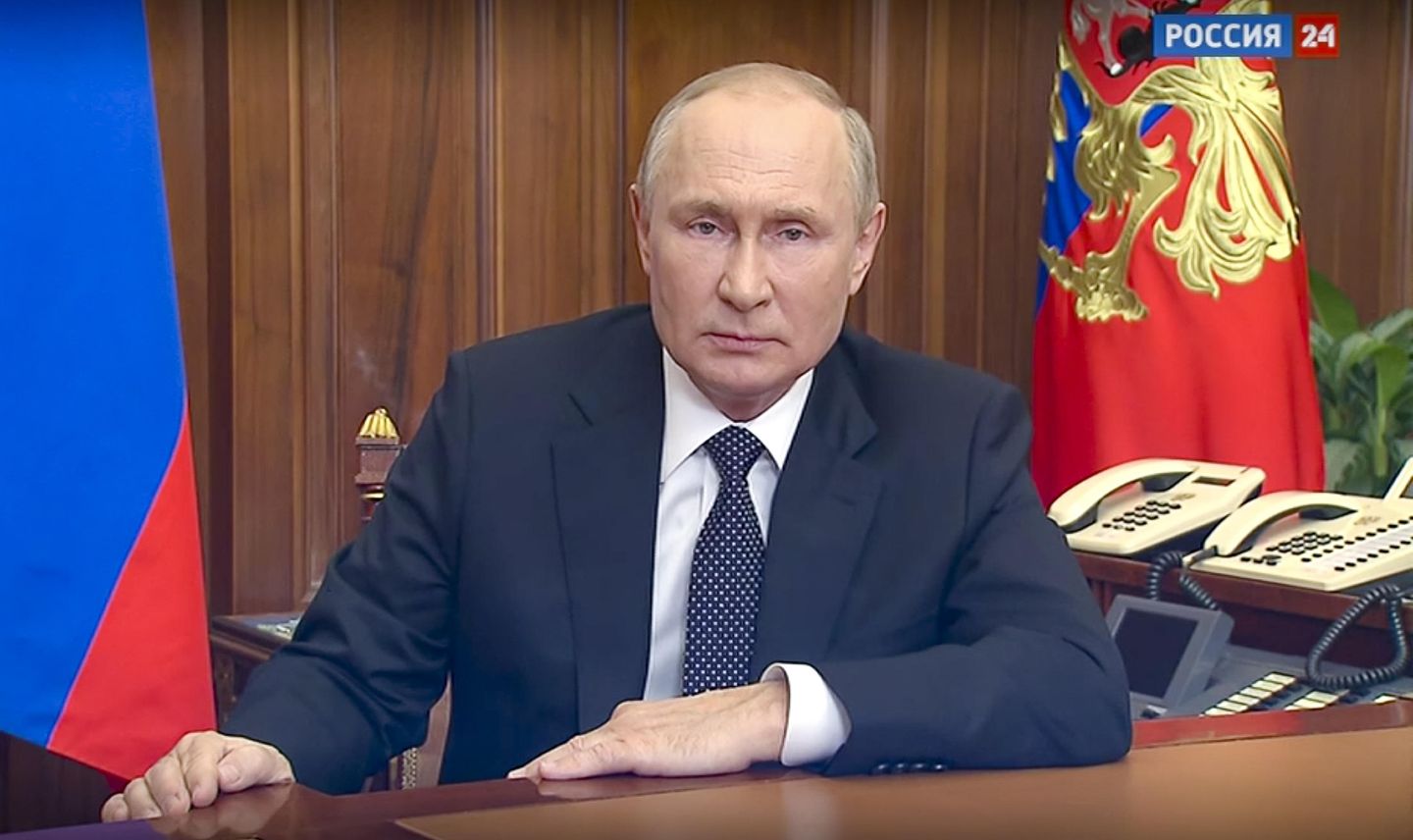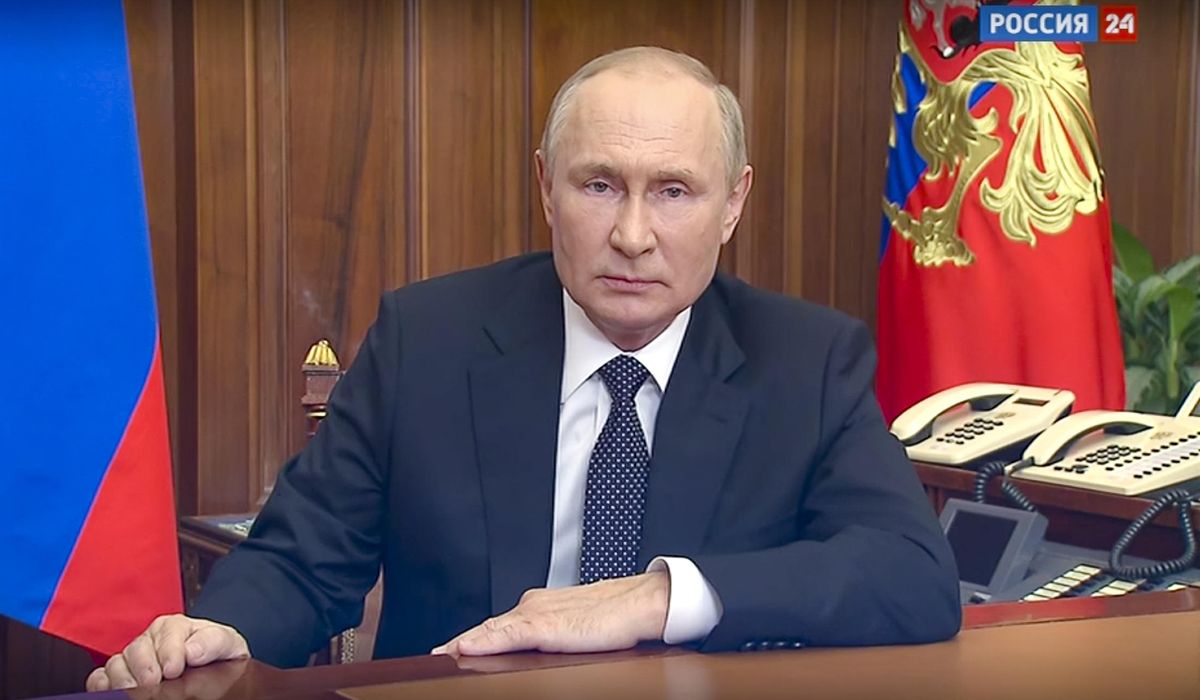

KYIV, Ukraine (AP) — Russian President Vladimir Putin ordered a partial mobilization of reservists in Russia, in a measure that appeared to be an admission that Moscow’s war against Ukraine isn’t going according to plan after nearly seven months of fighting and amid recent battlefield losses for the Kremlin’s forces.
The Russian leader, in a televised address to the nation aired on Wednesday morning, also warned the West that he isn’t bluffing over using all the means at his disposal to protect Russia’s territory, in what appeared to be a veiled reference to Russia’s nuclear capability. Putin has previously warned the West not to back Russia against the wall and has rebuked NATO countries for supplying weapons to help Ukraine.
The total number of reservists to be called up is 300,000, officials said.
Only those with relevant combat and service experience will be mobilized, Russian Defense Minister Sergei Shoigu said. He added that there are around 25 million people who fit this criteria, but only around 1% of them will be mobilized.
Putin’s announcement came against the backdrop of the U.N. General Assembly in New York, where Moscow’s invasion of Ukraine last February has been the target of broad international criticism.
Ukrainian President Volodymyr Zelenskky is due to address the gathering in a prerecorded address on Wednesday. Putin didn’t travel to New York.
British Defense Secretary Ben Wallace described Putin’s mobilization announcement as “an admission that his invasion is failing.”
“He and his defense minister have sent tens of thousands of their own citizens to their deaths, ill-equipped and badly led,” Wallace said in a statement. “No amount of threats and propaganda can hide the fact that Ukraine is winning this war, the international community are united and Russia is becoming a global pariah.”
The partial mobilization order came a day after Russian-controlled regions in eastern and southern Ukraine announced plans to hold votes on becoming integral parts of Russia — a move that could set the stage for Moscow to escalate the war following Ukrainian successes.
The referendums, which have been expected to take place since the first months of the war, will start Friday in the Luhansk, Kherson and partly Russian-controlled Zaporizhzhia and Donetsk regions.
The war, which has killed thousands of people, has driven up food prices worldwide and caused energy costs to soar. It has also brought fears of a potential nuclear catastrophe at Europe’s largest nuclear plant in Ukraine’s now Russia-occupied southeast.
In his address, Putin accused the West in engaging in “nuclear blackmail” and noted “statements of some high-ranking representatives of the leading NATO states about the possibility of using nuclear weapons of mass destruction against Russia.”
He didn’t identify who had made such comments.
“To those who allow themselves such statements regarding Russia, I want to remind you that our country also has various means of destruction, and for separate components and more modern than those of NATO countries and when the territorial integrity of our country is threatened, to protect Russia and our people, we will certainly use all the means at our disposal,” Putin said.
He added: “It’s not a bluff.”
Putin said he has already signed the decree for partial mobilization, which is due to start on Wednesday. A full-scale mobilization would likely be unpopular in Russia and could further dent Putin’s standing after the recent military setbacks in Ukraine.
“We are talking about partial mobilization, that is, only citizens who are currently in the reserve will be subject to conscription, and above all, those who served in the armed forces have a certain military specialty and relevant experience,” Putin said.
On the referendum plans, Putin noted that Russia-backed authorities of the occupied Ukrainian regions asked the Kremlin to support them in their effort to become part of Russia.
“We will do everything to provide safe conditions during referendums, so that people can express their will,” Putin stressed.
Foreign leaders have described the ballots as illegitimate and nonbinding. Zelenskyy said they were a “sham” and “noise” to distract public attention.
Shoigu, the Russian defense minister, also said that 5,937 Russian soldiers have died in the Ukraine conflict, far lower than Western estimates that Russia has lost tens of thousands.
In his nightly address Zelenskyy said Ukraine’s commitment to retake areas occupied by Russian forces remained unchanged.
“The situation on the front line clearly indicates that the initiative belongs to Ukraine,” he said. “Our positions do not change because of the noise or any announcements somewhere. And we enjoy the full support of our partners in this.”
Even a partial mobilization is likely to increase dismay among Russians about the war. The Vesna opposition movement called for nationwide protests on Wednesday, saying “Thousands of Russian men — our fathers, brothers and husbands — will be thrown into the meat grinder of the war. What will they be dying for? What will mothers and children be crying for?”
It was unclear how many would dare to protest amid Russia’s overall suppression of opposition and harsh laws against discrediting soldiers and the military operation.
The upcoming referendum votes are all but certain to go Moscow’s way.
In another signal that Russia is digging in for a protracted and possibly ramped-up conflict, the Kremlin-controlled lower of house of parliament voted Tuesday to toughen laws against desertion, surrender and looting by Russian troops. Lawmakers also voted to introduce possible 10-year prison terms for soldiers refusing to fight.
If approved, as expected, by the upper house and then signed by Putin, the legislation would strengthen commanders’ hands against failing morale reported among soldiers.
In the Russian-occupied city of Enerhodar, shelling continued around Europe’s largest nuclear power plant. Ukrainian energy operator Energoatom said Russian shelling again damaged infrastructure at the Zaporizhzhia nuclear power plant and briefly forced workers to start two diesel generators for emergency power to the cooling pumps for one of the reactors.
Such pumps are essential for avoiding a meltdown at a nuclear facility even though all six of the plant’s reactors have been shut down. Energoatom said the generators were later switched off as main power was restored.
The Zaporizhzhia Nuclear Power Plant has been a focus for concern for months because of fears that shelling could lead to a radiation leak. Russia and Ukraine blame each other for the shelling.
